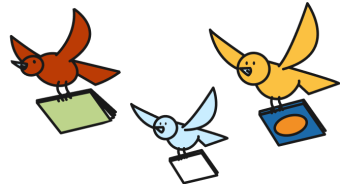
Dini, a young dinosaur, desperately needs a bath after playing in the mud. Young readers will quickly figure out that before he washes, he must take off his shoes, pants, etc. The repetition is sure to delight the youngest as they identify what Dini has left. Text and simple, flat illustrations show “Dirty Dini Dinosaur” as he splashes in the tub and into his loving mother’s arms.
Dini Dinosaur

Dinosaurs ready for the dance contest in this silly, lively, lighthearted look at popular programs. Rhymes and wordplay present dressed up dinosaurs doing everything from tap to the twist until the unnamed dino-emcee comes for his dinner — the contestants!
Dancing with the Dinosaurs

Moms and dads often do the same things in different ways but one thing they share in common, they both love their children “the exact same way.” Lighthearted illustrations and a predictable narrative depict the lively, affectionate relationship between a young child and her parents.
Daddies Do It Different

One day the little Bunny, called honey by his mother, is separated from her while playing in the woods. They reunion comes when he hears her call for ‘Bunny, my honey!’ All’s well that ends well in this comforting, attractive book by the illustrator of Guess How Much I Love You.
Bunny My Honey

Sophie longed to join the ballet class she watched through the window but she wondered if the teacher would accept her — after all, a swan is not the typical student. Humor combines with ballet in gentle, realistic, expressive illustration for a droll and satisfying story.
Ballerina Swan

Meet Ana, a young girl who loves to read. There aren’t many books in her small Colombian village, though — until the day Ana meets the Biblioburro, a librarian who brings books through the mountains on the backs of two strong donkeys. Inspired by the heroic efforts of real-life librarian Luis Soriano, this story asks readers, “How far would you go for a book?”
Waiting for the Biblioburro
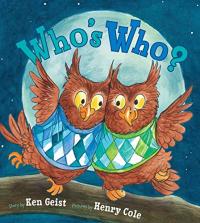
In this rhyming celebration of doubles, twin animals live on farms, in jungles; they race and play and make noise — sometimes to the comical chagrin of others around them seen in expressive, droll illustrations. Readers may recognize the rhythmic pattern of “Over in the Meadow” with a fresh twist.
Who’s Who

One Saturday, Esme who lives with her grandparents on a farm, goes with her grandfather to the county auction to buy the animal promised. The girl chooses Trudy, a small brown and white goat, and discovers a strong bond with this very special animal. Richly toned paintings depict the affection and farm life — concluding with a lovely surprise for Esme.
Trudy

During his first spring, the narrator was shorter than the grasses but grew into a fine but small evergreen tree. When people with saws came, they took the little evergreen by its roots where it was decorated with sparkles then planted. Lush, realistic illustrations show the passage of time and how the no longer small evergreen provided a home to other creatures.
The Littlest Evergreen

All mama bears must sometimes be separated from their cubs if only for a while, Little Bear’s mother tells him. But her love is constant and whenever a kiss is needed, Mama and her cub can take one out of a special box. Soft, expressive illustrations convey their sharing and love. A storyteller’s note may inspire others to make their won Kiss Boxes.
The Kiss Box
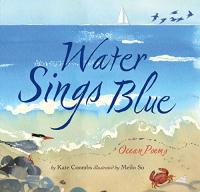
Translucent watercolors and short, varied poems take readers on a trip to the sea. There they meet sea birds, fish, coral, and more in each short verse. Evocative language creates memorable images of the sea and its often hidden treasures.
Water Sings Blue: Ocean Poems

Bright illustrations accompany lively poems that celebrate children’s imaginations and playing outdoors on warm days. Some games, like ‘jacks’, may need a bit of explanation but walking on the edges (of sidewalks, curbs, etc.) and hopscotch are perennial favorites. Everyone may be inspired to go outside and play!
A Stick Is an Excellent Thing: Poems Celebrating Outdoor Play

Decked out in rain boots, hat, and umbrella, a child joins her friends to play in the rain. The sound of the rain, mud, and finally sunshine is evoked by alliterative language and wordplay. The joy of getting dirty outdoors concludes with the girl and her dog in the midst of a messy but exuberant bubble bath.
Split! Splat!

Humorous, sometimes slightly gross, always kid-friendly poems are accompanied by lighthearted black and white sketches. A range of readers, from sophisticated to those less initiated, are sure to find chuckles in this thick but accessible collection of short, rhythmic poems.
I’ve Lost My Hippopotamus

In this version of a familiar tune, Jo MacDonald (the old farmer’s granddaughter) and her cousin plant a Spring garden, watch it grow, observe what visits it, gather its bounty before the cycle ends only to begin again. Engaging illustrations suggest ways to dramatize the yearly cycle, and suggested activities conclude the book.
Jo MacDonald Had a Garden

Textured illustrations cleverly incorporate die-cuts exploring the many shades of green. Language is as inspired as the textured paintings, subtly suggesting an environmental note. The book concludes with “forever green” in which a man and a child admire a large, lush tree, presumably from a seedling planted earlier.
Green

The sky is as changeable as the weather — from blue sky to rain sky to dark sky and ultimately to sleep sky. A poetic depiction of the sky introduces weather and a child’s day in simple, repeating language and richly colored illustrations that may inspire writing “list poems.”
Blue Sky

A young gardener plants seeds and waits for the transformation from late Winter’s mud brown to the lush green of Springtime. Evocative, lyrical text and delicate, expressive illustrations follow the evolution and depict the gradual change — all with understated humor.
And Then It’s Spring
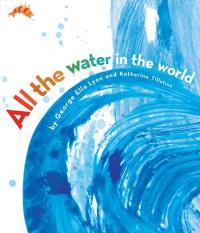
Rich, rhythmic language combines with lush illustration to poetically describe the water cycle and more. This memorable volume will be read aloud — and perhaps discussed as: “Thirsty air/licks it [water] from lakes/sips it from ponds/guzzles it from oceans…”
All the Water in the World
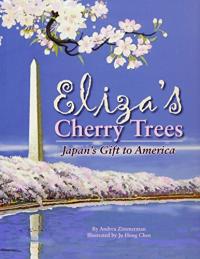
Eliza’s Cherry Blossoms

A Forest of Stories

Under the Cherry Blossom Tree: An Old Japanese Tale
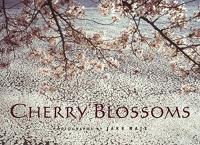
Cherry Blossoms: Photos

